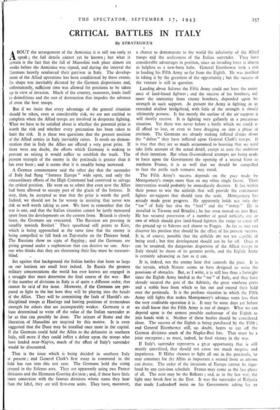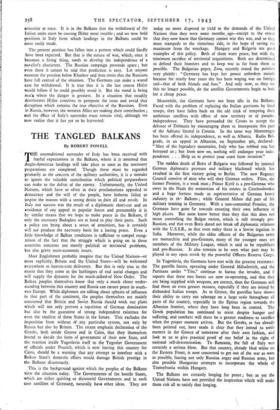CRITICAL BATTLES IN ITALY
By STRATEGICUS
ABOUT the arrangement of the Armistice it is still too early to speak ; the full details cannot yet be known ; but what is certain is the fact that the fall of Mussolini took place almost six weeks before the Armistice was signed, and during the interval the Germans heavily reinforced their garrison in Italy. The develop- ment of the Allied operations has been conditioned by these events. Its shape was inevitably dictated by the German dispositions and, unfortunately, sufficient time was allowed for positions to be taken up in view of invasion. Much of the country, moreover, lends itself to demolitions and the sort of destruction that impedes the advance of even the best troops.
But if we insist that every advantage of the general situation should be taken, even at considerable risk, we are not entitled to complain when the Allied troops are involved in desperate fighting. What we have to be satisfied about is whether the potential prize is worth the risk and whether every precaution has been taken to limit the risk. It is these two questions that the present position of the Allied armies in Italy inevitably raises. It needs no demon- stration that in Italy the Allies are offered a very great prize. If there were any doubt, the efforts which Germany is making to prevent us seizing it would suffice to establish the truth. The present strength of the enemy in the peninsula is greater than it has ever been ; and it seems that it is steadily being increased.
A German commentator said the other day that the surrender of Italy had flung "fortress Europe " wide open, and only the extraordinary efforts of the High Command had contrived to salvage the critical position. He went on to admit that even now the Allies had been allowed to occupy part of the glacis of the fortress. It may, then, be accepted as true that the prize is worth the peril. Indeed, we should not be far wrong in insisting that never was risk so well worth taking as now. We have to remember that the war is one, and that the Italian situation cannot be justly measured apart from the developments on the eastern front. Briansk is closely beset, the Germans say evacuated. The Russians are pressing in steadily towards Roslavl.' Their spearhead still points to Kiev, which is being approached at the same time that the enemy is being compelled to fall back on Zaporozhe on the Dnieper bend. The Russians show no signs of flagging ; and the Germans are giving ground under a euphemism that can deceive no one. Any- one who thinks that they are shortening their line must be measure- blind.
Set against that background the Italian battles that loom so large on our horizon are small beer indeed. In Russia the greatest military concentrations the world has ever known are engaged in a struggle that must determine the final course of the war. But if the number of divisions in Italy is, of quite a different order, that cannot be said of the issue. Moreover, if the Germans are pre- pared to fight to the last here they will be playing into the hands of the Allies. They will be committing the fault of Harold's un- disciplined troops at Hastings and leaving positions of tremendous strength for others that are incomparably weaker. Germany is at least determined to write off the value of the Italian surrender as far as that can possibly be done. The seizure of Rome and the liberation of Mussolini are inspired by this motive. It is even suggested that the Duce may be installed once more in the capital. If the Germans could hold the Allies to the defensive in southern Italy, still more if they could inflict a defeat upon the troops who have landed near—Naples, much of the effect of Italy's surrender would be discounted.
That is the issue which is being decided in southern Italy at present ; and General Clark's first essay in command in the field has run into this test case. The Germans hold the rising ground in the Salerno area. They are apparently using two Panzer divisions and the Hermann Goering division ; and, if these have little more connexion with the famous divisions whose name they bear than the label, they are still first-rate units. They have, moreover, a chance to demonstrate to the world the inferiority of the Allied troops and the uselessness of the Italian surrender. They have considerable advantages in position, since an invading force is almost as helpless as a new-born babe. General Eisenhower took a risk in landing his Fifth Army so far from the Eighth. He was justified in taking it by the greatness of the opportunity ; but the success of the venture is still in question.
Landing about Salerno the Fifth Army could not have the assist- ance of land-based fighters ; and the success of his bombers, stilt more the immunity from enemy bombers, depended upon hit strength in such support. At present the Army is fighting in an extended shallow bridgehead, with little of the strength it should ultimately possess. It has merely the outline of the air 'support it will shortly receive. It is fighting very gallantly in a precarious situation. Yet there was never before a battle which we could sc ill afford to lose, or even to have dragging on into a phase of attrition. The Germans are already making inflated claims about the " defeat " they have inflicted upon General Clark's troops. It is true that they are so much accustomed to boasting that we need take little account of the actual detail, except to note the ambition of their intention. But when ill-considered attempts are being made to force upon the Government the opening of a second front in northern France, it is as well that we should be compelled to face the perils such ventures may entail.
The Fifth Army's success depends on the pace made by Montgomery's troops more than on any other single factor. Their intervention would probably be immediately decisive. It lies within their power to win the airfields that will provide the continuous fighter air-support that should turn the scale. Montgomery has suready made great prqgress. He apparently holds not only the " toe " of Italy but also the " heel " and the " instep." He is installed in Taranto and Brindisi ; he has even moved on into Bari. He has secured possession of a number of good airfields, one or two of which should give land-based fighters the range to cover all the ground up to Salerno and almost to Foggia. As far as one can discover his position that should be the effect of his present success. It is, of course, possible that the airfields are not yet capable of being used ; but that development should not be far off. Once it can be assumed, the dangerous dispersion of the Allied trccps in Italy should' be shorn of its greatest perils, and the Eighth Army is certainly advancing as fast as it can.
It is, indeed, not the enemy here that controls the pace. It is the terrain, which Nature seems to have designed to assist the provision of obstacles. But, as I write, it is still less than a fortnight since the Eighth Army landed in the " toe " of Italy, and they have already secured the gate of the Adriatic, the great southern ports and a stable base from which to fan out and extend their hold over the peninsula. It is the perilous situation in which the Fifth Army still fights that makes Montgomery's advance seem less than the very creditable operation it is. It may be some days yet before we shall know that the Fifth Army is out of danger. What we can depend upon is the utmost possible endeavour of the Eighth to join hands with it. Neither of these battles should be considered alone. The success of the Eighth is being purchased by the Fifth ; and General Eisenhower still, no doubt, hopes to cut off the German divisions south of the Naples-Bari line. That must be a joint enterprise ; as must, indeed, be final victory in the war.
If Italy's surrender represents a great opportunity that is still mainly unrealised, that should not cause too much surprise and impatience. If Hitler chooses to fight all out in the peninsula, lie may construct for the Allies as important a second front as anyone can desire. The order of the invasions of Europe cannot be regu- lated by any cast-iron schedule. France may come as the last phase of all. The next may be the Balkans ; and, as in the last war, the light may break first in the East. It was the surrender of Bulgaria that made Ludendorff insist on his Government asking for an armistice at once. It is in the Balkans that the withdrawal of the Italian units must be causing Hider most trouble ; and we now hold positions in Italy from which landings in the Balkans could be most easily made.
The present position has fallen into a pattern which could hardly have been expected. But that is the nature of war, which, once it becomes a living thing, tends to develop the independence of a novelist's characters. The Russian campaign proceeds apace ; but even there it cannot be said that prediction is easy. Let anyone examine the position below Kharkov and then insist that the Russians have full control of the situation. The Germans can make a sound case for withdrawal. It is true that it is the last course Hitler would follow if he could possibly avoid it. But the stand is being macV where the danger is greatest. In a situation that steadily deteriorates Hitler contrives to postpone the issue and avoid that disruption which remains the true objective of the Russians. Even in Russia, however, the western Allies are making their contribution ; and the effect of Italy's surrender must remain vital, although we now realise that it has yet to be harvested.



























 Previous page
Previous page